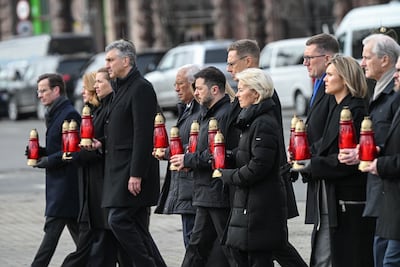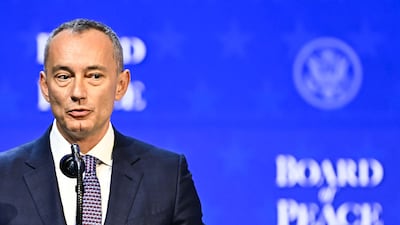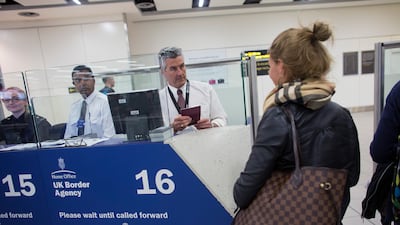
Hello from The National and welcome to the View from London – your weekly guide to the big stories from our London bureau
Missile crunch
At the launch of the Military Balance 2026 report at London's International Institute of Strategic Studies, the expectation that the US will strike Iran in the near future was fairly clear.
The talk was of the limits to the US capacity to do so, given the potential overstretch of the navy as the USS Gerald R Ford moves within strike range.
Douglas Barrie, senior fellow for military aerospace, said the US can launch an assault on Iran should the talks due between Tehran and Washington in Geneva this week peter out.

He said that in the event of Iranian missiles being launched, a vital role could be played by Terminal High Altitude Area Defence (Thaad) interceptors, which are “protection against Iran's ballistic missile arsenal”.
Mr Barrie said of last year’s 12-day war between Iran and US ally Israel: “It was interesting to note just how high the expenditure rate in interceptors was and I think that is something that will be in the back of the mind.”
Ukraine anniversary
Researchers at the IISS press conference noted that Russia's losses on the Ukraine frontline were running at a “significantly higher rate” and outpacing commanders' ability to recapitalise forces. So far there is no sign of the wider mobilisation in Russia that could repair that gap.
At commemorations in Kyiv on Tuesday to mark the war's fourth anniversary, Ukraine's President Volodymyr Zelenskyy extended an invitation for US President Donald Trump to visit.
Mr Zelenskyy urged Ukraine's allies to sustain their support against Russia's invasion after splits among Kyiv's European partners overshadowed the commemorations.

European Commission President Ursula von der Leyen reassured Ukraine that EU states would agree on a €90 billion ($106 billion) loan after Hungary collapsed the package in a dispute over pipeline repairs. The promise was to be the centrepiece of solidarity events this week.
Faith and unity
High-profile guests attended the annual interfaith iftar hosted by the UAE embassy in west London last night. One of the highlights of the month-long fast is how people come together for these diplomatic events.
Among those attending were the UK's Deputy Prime Minister David Lammy, Mayor of London Sadiq Khan and Hamish Falconer, the Middle East Minister.
Rule of fear
A Farsi-language TV channel based in the UK has been forced to suspend its live broadcasts after reported threats from the Iranian government.
ManotoTV said its landlord evicted the broadcaster from its London studios after receiving a warning from the UK’s Counter Terrorism Policing of a “potential threat”. The broadcaster blamed the Iranian government’s pursuit of independent news outlets.
Dan Jarvis, the Security Minister, said last year that Iran had been trying to stifle criticism in the UK through intimidation and fear. “The Iranian regime is targeting dissidents and media organisations and journalists reporting on the violent oppression of the regime,” he said.
Read more
The National produces newsletters across an array of subjects. You can sign up here. To receive The Editor's Briefing, our Editor-in-Chief's weekly newsletter that rounds up the top stories, sign up here.



